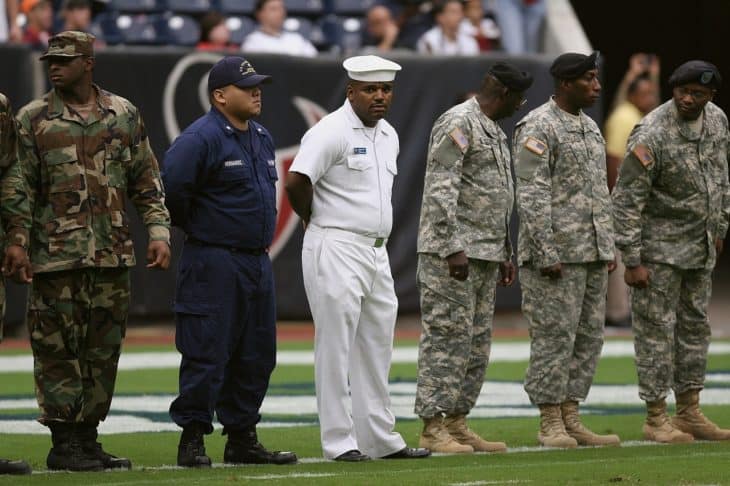It is not uncommon to see civilians wearing assorted military attire. While anyone can wear a pair of camo pants or a US Army jacket, wearing a military uniform may not be considered disrespectful. It could also be illegal in specific situations.
TLDR – In the United States, it is legal for civilians to wear military uniforms. However, it is against the law to impersonate a member of the military for personal gains, such as wearing a uniform to commit fraud.
Is It Illegal for a Civilian to Wear a Military Uniform?
The US Government passed the Stolen Valor Act in 2005. The Act made it illegal to wear or falsely claim to have received any military medal or decoration without authorization. However, the Act was later ruled unconstitutional.
Congress later passed the Stolen Valor Act of 2013, which made it an offense to wear military uniforms with the intent to deceive others. A civilian can legally wear a military uniform if they do not wear it while committing fraud or any other deceitful act.
Is it Disrespectful for Civilians to Wear Military Clothing?
Some veterans may find it disrespectful when they see a civilian wearing a military uniform in public. However, the veteran’s outlook often depends on several factors, including the intention of the individual wearing the uniform.
If someone is wearing a uniform in a deceptive manner, such as to make others think that they are a veteran, real veterans and most civilians will take offense. Wearing an individual article of military clothing, such as a jacket, pants, or a hat, is less likely to create a strong response. However, the clothing should be free of any official medals or patches.
There are also multiple types of uniforms and military gear that civilians may obtain. Fatigues are the most common military attire worn by civilians. Also called the battle dress uniform, fatigues typically consist of camo trousers and a jacket. If the fatigues do not contain patches that identify a branch or unit of the military, the individual wearing them is not likely to be mistaken as a veteran.
Civilians rarely wear formal dress uniforms, which are more distinctive and recognizable compared to fatigues. A formal dress uniform is more likely to create the impression that the individual wearing it is a veteran.
Can Civilians Wear Military Patches?
Civilians should not wear military patches or insignia as it may create the impression that the individual served in the military. While it is not illegal to wear a military patch, wearing one may be considered a form of stolen valor.
Veterans also rarely wear military patches except when participating in parades or official events. Every branch of the military has specific regulations concerning the display of military insignia. Veterans who are not on active duty are typically restricted from wearing medals and patches.
Members of the military may also be required to only wear medals, patches, and insignia as part of their complete uniform. This means that a veteran may not be permitted to wear a medal on their civilian jacket.
What Is the Penalty for Impersonating a Member of the Military?
The maximum penalty for impersonating a member of the military is one year in Federal prison. Individuals convicted under the Stolen Valor Act may also face fines and additional criminal or civil charges. For example, committing fraud while posing as a veteran may result in fraud charges.
The Stolen Valor Act of 2013 revised existing laws to make it illegal for someone to pretend to be a veteran for material personal gain. However, individuals are rarely prosecuted under the Stolen Valor Act.
Pretending to be a veteran is not always illegal. Impersonating a member of the military to gain attention or respect is not a crime. For a case to qualify as “stolen valor”, the individual must gain a tangible benefit from falsely claiming to be a veteran. For example, it is illegal to impersonate a member of the military to obtain discounted or free goods or services.
Anyone can report a violation of the Stolen Valor Act. Reports are typically submitted to the FBI. However, there are also many nonprofit organizations dedicated to protecting veterans and investigating cases of stolen valor.
Related Posts














